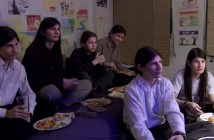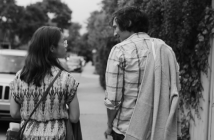
Editor’s Notes: Li Wen at East Lake will be screening at TIFF on June 14th in part of You Can’t Go Home Again: The Films of Luo Li. For more information on this film series visit TIFF.net and follow TIFF on Twitter at @TIFF_NET.
Li Wen at East Lake feels like two films in one. It begins in a clear, straightforward manner, presenting like a documentary as it examines East Lake, located in the city of Wuhan in China. Once large and expansive, the lake has, over time, become slowly filled in in favour of apartment complexes, an amusement park, and soon, if the proposal passes, an airport. The first part of the film is an almost-silent showcasing of the lake, rollercoaster, and amusement park attractions, accented by dialogue primarily during a meeting in which committee members voice their opinions on the value, or non-value, of the lake. It is a classic debate of environmentalism vs. capitalism; of tradition and romanticism vs. moving forward and creating new opportunities for memories. The many long and silent shots of the lake and general goings-on are punctuated by still images, usually maps showing the changes over time in East Lake and its surrounding area. These images enhance the documentary feel of this first part of Li Wen at East Lake.
It is a classic debate of environmentalism vs. capitalism; of tradition and romanticism vs. moving forward and creating new opportunities for memories.
It is a sudden surprise when the title of the film appears about 35 minutes in; this unusual timing is jolting and effectively signals a reconstruction of the film. Indeed, soon after the title appears, the storyline focuses primarily on Li Wen. Initially rather unlikeable, Li Wen is a multifaceted character who pessimistically scoffs that there is no point in worrying about things like the disappearance of East Lake, as it’s an issue out of anyone’s hands, and there are plenty of problems to worry about but little to be done about any of it. As time goes on, Li Wen reveals himself as an illustrator and a talented landscape artist, as well as photography aficionado. He is commissioned to paint something to be hung in the very apartments being built on East Lake. One of the most intriguing sequences involves an increasingly heated back-and-forth debate between Li Wen and a university student, where they discuss gender, castration, and semantics. Punctuated by large bites of food and puffs on cigarettes, it is most certainly the most straightforward and relatable scene in the film, and shows that Li Wen has thoughts and opinions about all sorts of things, and will animatedly engage in the right situation.
Luo Li’s film has departed from its original documentary style, becoming instead a character study of Li Wen as he looks for the fantastical dragon man.
Luo Li’s film has departed from its original documentary style, becoming instead a character study of Li Wen as he looks for the fantastical dragon man. We discover that Li Wen is a police officer tasked with hunting down a so-called crazy man who has been telling the people of Wuhan that a dragon lives in East Lake, and will be making an appearance soon. Li Wen’s boss is angered by this man’s claims, worried he will do something outlandish to interfere with the finalization of the plans for the airport. He acknowledges Li Wen’s general tiredness but insists that something must be done about this man. Li Wen sits crumped in his chair, saying only to his friend after their boss has left the room: “Kill me.” It is a strikingly different response from the many thoughts he offered during his debate with the student.
The shots of the lake, of boaters and swimmers enjoying the water, and of family and friends talking and laughing while they fish on its shore, are so serene and calming that one almost hopes as the film progresses that the story about the dragon is true; and that the airport will not be approved, so that the history, tradition and fantasy of East Lake will remain untouched until the dragon appears one day to reclaim what belongs to it, instead of money-hungry capitalists.
Li Wen at East Lake is structurally unusual as it drifts between documentary and fiction, taking the viewer on a two-hour trip that asks questions about capitalism, the environment, the importance of tradition and storytelling, of culture and human connection, and when a person can and should be who they are. It is an intriguing film that demonstrates the Canadian director’s unique filmmaking tactics and deserves at least one viewing.
Li Wen at East Lake is structurally unusual as it drifts between documentary and fiction, taking the viewer on a two-hour trip that asks questions about capitalism, the environment, the importance of tradition and storytelling, of culture and human connection, and when a person can and should be who they are. It is an intriguing film that demonstrates the Canadian director’s unique filmmaking tactics and deserves at least one viewing.



